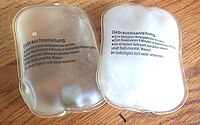
Photo from wikipedia
Abstract This paper proposes a battery thermal management system with an inorganic phase change material(PCM). A multiscale encapsulation method is presented to solve the inherent problems of the inorganic PCM-sodium… Click to show full abstract
Abstract This paper proposes a battery thermal management system with an inorganic phase change material(PCM). A multiscale encapsulation method is presented to solve the inherent problems of the inorganic PCM-sodium acetate trihydrate (SAT)-Urea. This method adopts microscale encapsulation with expanded graphite (EG) to enhances the thermal conductivity of the PCM to 4.96 W/m·K and eliminates the liquid leakage. Further macroscale encapsulation with the organosilicon sealant significantly improves the long-term stability of the salt hydrate, because it completely cuts off the dehydration channel of the salt hydrate, maintaining a stable composition in the PCM. This effective multiscale encapsulation paves the way of applications of the inorganic PCMs in Li-ion battery thermal management. This inorganic PCM is compared with an organic PCM in the fire resistivity and cooling performance for a 20-cell battery pack. The results confirm that the inorganic PCM is safer because it is not flammable and offers a cooler but a more uniform thermal environment for the battery. The competitive inorganic PCM owns advantages in price, safety and cooling performance, showing great prospects in commercial battery thermal management systems.
Journal Title: Applied Thermal Engineering
Year Published: 2021
Link to full text (if available)
Share on Social Media: Sign Up to like & get
recommendations!